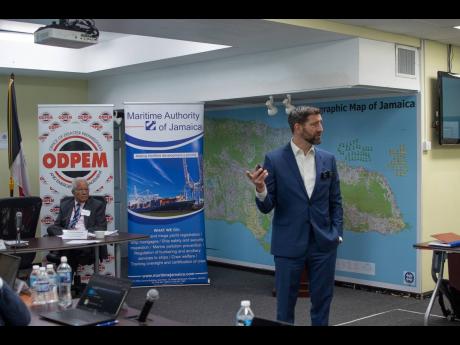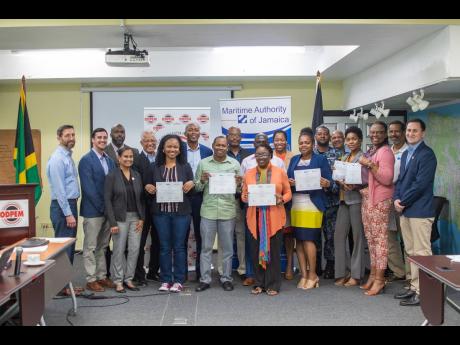Jamaica hosts oil spill contingency planning workshop
“STATES SUCH as Jamaica which depend on international shipping for our foreign trade, are particularly very vulnerable to marine pollution from ships and other marine vessels” said Rear Admiral (ret’d) Peter Brady, director general of the Maritime Authority of Jamaica (MAJ), in his opening remarks to stakeholders in attendance at a three-day national workshop on Oil Spill Contingency Planning, from February 19-21.
The event was organised by Regional Activity Centre/Regional Marine Pollution Emergency, Information and Training Centre-Wide Caribbean Region (RAC-REMPEITC-Caribe), the International Maritime Organization (IMO) and the MAJ.
The workshop brought awareness to the nation’s National Oil Spill Contingency Plan by providing training on oil spill preparedness and contingency planning, as well as hands-on working knowledge of the use and advantages of the Regional Association of Oil, Gas and Biofuels Sector Companies in Latin America and the Caribbean Readiness Evaluation Tool for Oil Spills (RETOS) in analysing and identifying gaps in national oil spill contingency plans.
Brady reminded participants that Jamaica’s first Oil Spill Contingency Plan was developed with the assistance of Transport Canada in the mid-’70s and has since then undergone several changes.
The current National Oil Spill Contingency Plan was last comprehensively updated in 2014. Work on the plan continued formally at a National Contingency Planning and OPRC Workshop conducted by RAC-REMPEITC in October 2019, pre-COVID. However, the exercise was not completed. “It therefore goes without saying that this workshop is not only timely, but also critical,” said Brady.
The workshop was hosted at the Office of Disaster Preparedness and Emergency Management. The agency’s director general, Richard Thompson, reminded the gathering that the Caribbean is a small geographic territory and a major spill in one of the Caribbean counties could impact all of us.
“Our livelihood is hinged on tourism and the importance of maintaining our white-sand beaches, plus a lot of livelihoods in the region surround our territorial waters. We must then ensure we are protecting our maritime space, our coastal ecosystem for the present and for future generations.” Thompson said.
Bertrand Smith, the MAJ’s director of legal affairs, added, “The RETOS tool is an excellent tool to evaluate our National Oil Spill Plan. It is comprehensive and extremely helpful. But we needed experts to guide us and to help us understand this tool.”
The workshop was facilitated by Nadia Gour, IMO consultant RAC/REMPEITC-Caribe; Lt Matthew Martin, US coast guard; IMO consultant RAC/REMPEITC-Caribe; Michael Hernandez, senior response specialist, Oil Spill Response Limited; and Paul Latannzi, consultant at The Paratus Group.
Martin said that by facilitating this workshop, they were “carrying out the mandate of RAC/REMPEITC-Caribe once again in supporting Caribbean countries in the wider Caribbean region to enhance their capabilities to prepare for, respond and coordinate across boundaries for oil spills”. He also expressed the timeliness of this week’s workshop, where participants walked through a framework to identify areas for improvement for Jamaica and the region. Martin said, “We had a very productive week, and we look forward to continuing our work with both Jamaica and across the region as we continue our work in advancing oil pollution preparedness.”
The workshop pulled attendants from industry and non-government agencies with strong ties to oil spill contingency planning and response. The workshop was attended by Port Authority of Jamaica, Jamaica Fire Brigade, National Environment and Planning Agency, Maritime Authority of Jamaica, Petrojam Limited, Office of Disaster Preparedness and Emergency Management, Jamaica Defence Force Maritime Air Cyber Command and Jamaica Constabulary Force.
The agencies are expected to meet in April for further development of the National Oil Spill Contingency Plan.


